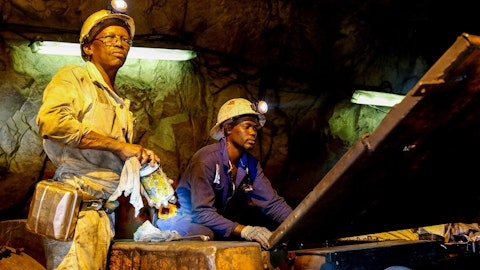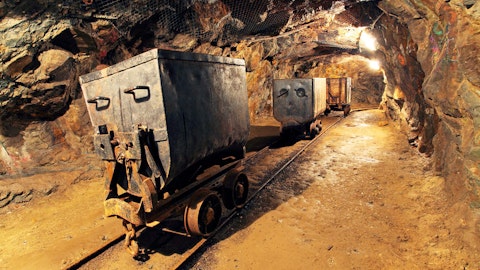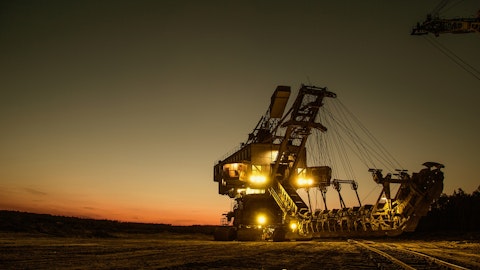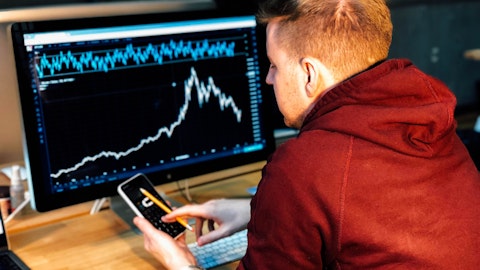Kathleen Quirk: This leaching initiative that we’re pursuing is not labor-intensive, because it’s already — the material has already been mined. So, that’s a real opportunity for us to execute on.
Richard Adkerson: And if we — what it opens up to us is unbelievable. I mean, we have — Morenci the largest leaching operation in the world. It has been for years. And by enhancing the existing leaching operations using all these tools, data analytics and heat covers and supplements, it’s really amazing. But then it opens up historical leach stacks and potentially places like Lone Star using leaching to replace or minimize concentrator investments. So, it’s really exciting. It’s beyond just this 200 pounds that we’re targeting now. But with success, it’s a great opportunity for us. And it’s not a fracking deal like it was in oil and gas industry. It’s not going to turn the dynamics of the supply situation upside down. But for a company like Freeport with the leaching operations that we have and the application with success to historical leach sites and future mine development, it’s something that’s really exciting.
And the great thing about it is to see the excitement of our own guys and own team that’s working on it. It’s really gratifying.
Operator: Our final question will come from the line of Bendik Folden Nyttingnes with Clarksons Securities. Please go ahead.
Bendik Folden Nyttingnes: With the revision in the mining, building in Chile at least sort of moving in the right direction, it would be interesting to get some color on what you’d realistically like to see to be comfortable with moving forward with El Abra expansion?
Richard Adkerson: Yes. I had the chance for the first time to meet the President of Chile when I was at APAC in Bangkok, and we had a very long conversation in advance of his presentation and it was really positive. And he explained to me what he’s facing, which I can appreciate, Kathleen met with him earlier. And so, like what’s going on in a lot of different countries around the world, particularly when commodity prices go up, people see the opportunity to take financial benefits through royalties and taxes and use them to meet social needs. And it’s just always a balancing situation. At one point, Chile built its whole economy on copper and was very successful. When I was talking with people in Indonesia, the Congo and other places, I would always point to Chile as an example of a country that to be successful by encouraging mining.
Chile for a number of reasons, labor and now government situation is losing — has lost and is losing competitive advantage that it once had. So, these government officials run on a platform of enhancing social programs and then they end up facing the reality of they go too far with that, what that does to their country in terms of its currency, in terms of its economic viability and investment and so forth. President of Chile understands that, and you can see that there has been a more positive tone of dealing with these issues. We’re not a real leader in Chile, although we are in the global copper business. So, we participate with the government, with other companies there and the conversations that are going on and share our experiences that we’ve had in working globally on these kinds of issues.
So, the current direction is clearly more positive than it was a year ago. The President is facing a low level of popularity now. And so, it’s a question of facing reality for political leaders. And we certainly lived our — based our share of those things. And as a mining company, you work hard to gain the trust of the politicians. If you do things the right way, you’re sensitive to their issues. You don’t try to take advantage every time you have a chance to take advantage. We’ve actually walked away from projects, because governments — we didn’t believe the deal the government was offering us was sustainable long-term deals. And that’s proved out to be the case. So it’s a complicated deal, big part of a business for the leader of a company.
And you’ve got to — as I said, listen, be responsible, and work to find middle ground so that it’s a win-win deal and you’re not taking advantage of anyone and you’re representing your stakeholders. You’re not letting somebody take advantage of you. And that’s what Chile is going through. I believe that the reasonable compromise will be reached because it’s in everybody’s interest for that to happen.
Kathleen Quirk: We’ll also be looking at the — how the constitutional process advances this year. And it appears the financial package is moving forward and they’re reaching some determination, looks as if that’s progressing. But we also want to look at how this constitutional process unfolds as well. And in the meantime, we’re maintaining our options by planning to move forward with the water infrastructure investments.
Richard Adkerson: And you know, I can’t let this call go by without telling you how personally pleased I am with our much improved relationship with the government in Indonesia, where we had a multiyear discussions, negotiations over our mining rights in our contract and so forth. It’s just been remarkable what’s happened in the last six months, I made three trips there. We had — the President had an incredibly positive visit to our job site at the end of August, early September. He asked me to accompany his investment minister and Kathleen was there, too. We did a university road trip and then — but the two of us went back for the B20 part of G20 and got to see the President and others and it’s just the — and then APAC and Bangkok. It’s just a great feeling to feel that we’re all altogether now working to — for the benefit of all the stakeholders and having the success we’re having on the ground at PT-FI. All right
Operator: With that, I will turn the call over to management for any closing remarks.
Richard Adkerson: All right. I was starting that. Thank you everybody for participating today. And you know we’re always available for follow-up calls. You can call David initially and he can make arrangements to talk with Kathleen or me or whoever we need to bring into conversation. Thank you for your participation. It’s great to have a quarter like this, and we’re really excited about our future.
Operator: Ladies and gentlemen, that concludes our call for today. Thank you for joining. You may now disconnect.
Follow Freeport-Mcmoran Inc (NYSE:FCX)
Follow Freeport-Mcmoran Inc (NYSE:FCX)
Receive real-time insider trading and news alerts





